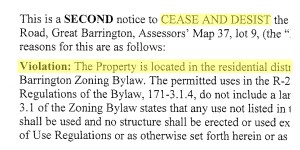By David Scribner
June 29, 2011
GREAT BARRINGTON – Building Inspector Edwin May, with the newly energized backing of the Great Barrington Board of Selectmen, has ordered the controversial O’Brien construction and landscaping business situated in a residential zone off Blue Hill Road to shut down, declaring that the property is not being used as a tree farm.
“In a letter to Town Counsel from your attorney,” May wrote in his cease-and-desist order, “it was stated that future use of the property by your company would be primarily for commercial agricultural/horticultural nursery use. However, the primary use of the property is not for agriculture or horticulture. It is for a landscaper’s yard. As noted above, the use of the property as a landscaper’s yard is not permitted.”

The building inspector has issued a second cease-and-desist order. Click the image to read the letter.
As a result of May’s directive, it may soon be a lot quieter for the residents of Blue Hill Road. But it took determination on the part of the embattled building inspector to get the law upheld. At one point, May said, his boss, Town Manager Kevin O’Donnell, threatened to fire him if he didn’t stop his enforcement campaign, and he had to overcome the influence of O’Brien’s attorney, Edward McCormick.
In many ways, the Rogers Road case had grown from what seemed like a simple dispute about zoning to an issue about the way Great Barrington’s town government functioned, and about the power of the town manager.
Last week, May issued his second cease-and-desist order to Gary O’Brien, proprietor of GJO LLC, a landscaping enterprise that May had determined was in violation of zoning regulations governing this residential district.
The June 23 letter gives O’Brien 15 days to comply with the order and to cease all operations by July 8.
If O’Brien abides by the cease-and-desist order, it will end a bitter dispute over the truck traffic and noise that his business, and the ancillary operations and activities that have gone on there, has produced. O’Brien’s business has prompted frequent complaints from several of his neighbors.
“This is the exact same letter that I delivered to O’Brien on Aug. 27, 2010, with a few additions,” May explained.
O’Brien can appeal May’s order to the Zoning Board of Appeals.
“It does seem to be a little quieter,” commented neighbor Judith Kales, “but I’m going to pay close attention.”
Since May’s original order was issued 10 months ago, however, the town, or at least O’Donnell, citing the advice of Town Counsel David Doneski, of Kopelman & Paige, had avoided enforcement of the directive. They cited their belief that a 1996 Superior Court judgment allowing the previous owner, Leamon Rogers, to park his garbage trucks on the property but not to engage in transfer of materials applied to O’Brien’s current activities.
Nevertheless, May insisted that O’Brien’s enterprise – plus several additional tenant businesses of his – violated zoning bylaws, and pressed for enforcement. May’s continuing pursuit of the matter brought him into conflict with O’Donnell. Complicating the issue was the fact that Doneski had, in fact, signed off on both cease-and-desist orders.
At a Board of Selectmen meeting earlier this month, Doneski declined to explain why he had approved the original cease-and-desist order, yet was reported to have advised the town not to enforce it.
O’Brien’s attorney, Edward McCormick, continued to argue that the language in the 1996 court order permitted O’Brien’s operations, which he described as preparatory to establishing a tree farm.
Doneski conceded that the town had decided not to pursue the matter – in fact, O’Donnell had directed the building inspector to “observe” O’Brien’s activities only – after McCormick, Doneski and O’Donnell had conferred in private.
The Board of Selectmen, however, were outraged at this avoidance of proper procedure that enabled O’Brien to avoid having his case heard in public before the ZBA, which is the designated board to adjudicate zoning disputes.
“I had been hoping all along that they would go the ZBA,” May said. “If they ignore me this time, I will take them to court. That other agreement they had in 1996 was done in the courtroom hallway.”
May said that if O’Brien fails to stop his operations, daily fines will accrue, at a rate of $25 for the first day, $50 for the second, $100 for the third, and $200 for each subsequent day he is in contempt of the order.
“I had to do something,” May commented, of his repeated attempts to have this illegal activity halted. “I had legal counsel and the help of the state building inspector. I have to say that the town counsel did agree with me that a cease-and-desist order should be issued.”
“The use of the property by your company is a different use and a substantial extension of the use allowed by the [1996] agreement,” May stated in the cease-and-desist order. “Your company’s use involves an increase in intensity with the addition of 16 or more trucks, in addition to the storage of 4 unregistered vehicles … Your company’s use adds 20 more employees … It is not the same nonconforming use … and is substantially more detrimental to the neighborhood.”
